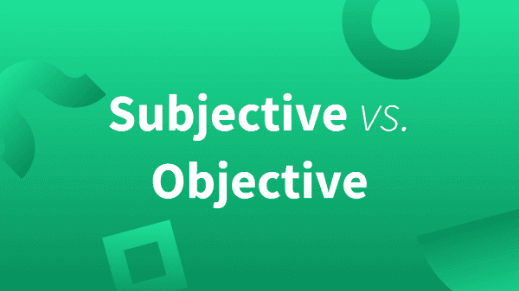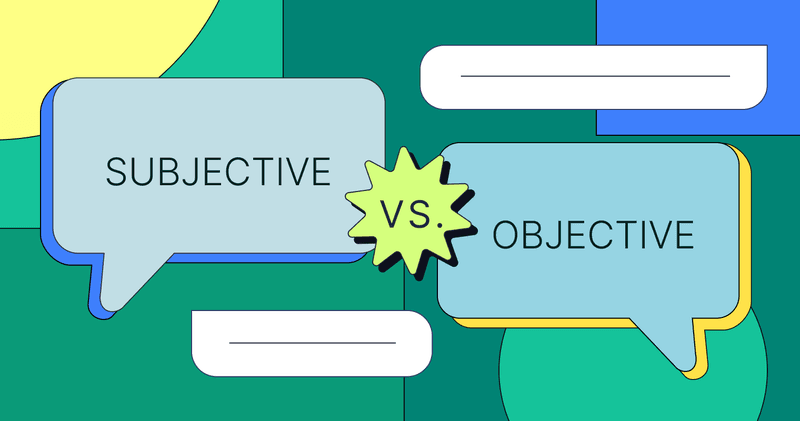The Spectrum of Perception: Exploring Subjective and Objective Realities
Contents

One of the trickiest aspects that non-native English learners in India grapple with is understanding the concept of subjective vs objective. Time and again, we have found students confused about when to use which term, often mixing up the two due to their contextual nuances.
The problem roots from the abstract nature of these terms— 'subjective' and 'objective'—which do not have direct translations into many Indian languages, making it difficult for learners to grasp their essence.
Clueless about the subjective vs objective meaning? Fret not! Our blog delves deeper into this topic, simplifying it with relatable examples and practical tips. So let's dive in and solve this linguistic puzzle together.
What does 'Subjective' Mean?
'Subjective', in English language, refers to situations or statements that are influenced by personal feelings, tastes, or opinions. They cannot be verified using concrete facts or figures. Essentially, anything subjective is fluid and varies from one individual to another based on their unique perspective.
To grasp the concept of subjective better, let's explore some examples of subjective sentences:
"I think butter chicken is the best Indian dish." - This statement reflects a personal opinion and thus is subjective.
"Mumbai is too crowded for my liking." - Here, the speaker's personal sentiments about Mumbai make this sentence subjective.
Exploring 'Objective' Language
Simply put, the term 'objective' refers to something that is not influenced by personal feelings, interpretations, or prejudice. It's considered factual and unbiased. Whenever we discuss "objective language" in English, it signifies a way of communication that is straightforward and based on facts.
Now let's dive deeper into understanding objective sentences using some examples:
Statement of Fact: Objective sentences often state undeniable facts. Example: The Taj Mahal is in Agra.
Impersonal Tone: These sentences do not reveal personal emotions or opinions. Example: India achieved independence in 1947.
Evidence-based: Any claim in an objective sentence can be verified with evidence. Example: According to data from the World Health Organization, there were over 219 million malaria cases globally in 2017.
Subjective Vs Objective: How Do They Differ?
When learning English, comprehending the distinction between subjective vs objective can be tricky. Let's break it down:
Subjective | Objective |
Influenced by personal feelings or opinions | Not influenced by personal feelings or opinions |
Can vary from person to person | Remains constant regardless of personal views |
For example, consider subjective vs objective sentences: "I believe Delhi is the most beautiful city in India" is subjective because it's based on personal opinion. On the other hand, "Delhi is the capital of India" is an objective statement, as it's a fact that doesn't depend on personal views.
In testing scenarios, understanding subjective vs objective test types can prove helpful. For instance, an essay is a subjective test relying on your interpretation while a multiple-choice quiz is an objective test gauging your knowledge of facts.
Remember that distinguishing between subjective vs objective data, questions and pronouns helps improve clarity in English communication.
When to Use Subjective and Objective Language?
Understanding when to use subjective vs objective language can elevate your English proficiency significantly. Let's dive into a few guidelines:

1. Subjective Language:
This is personal, opinion-based, and emotionally charged. Use subjective language when expressing personal viewpoints, feelings, or preferences. For example, in a book review, you might say, "I found the narrative riveting."
2. Objective Language:
This refers to facts and reality; it's unbiased and detached from personal feelings. Use objective language in academic writing, reports, or when stating verifiable facts. For instance, "The Earth revolves around the Sun" is an objective statement.
Turning this knowledge into practice is critical for mastering subjective vs objective usage. Here's a simple exercise to help you hone your skills:
Exercise: Reading, Speaking & Writing Practice
Read a blog post or news article. Identify five subjective and five objective sentences.
Next, immerse yourself in a conversation with a colleague or friend. Try to consciously use both subjective and objective sentences.
Finally, write a short paragraph describing your favourite movie – first using subjective language (your emotions and opinions), then another one using objective language (factual information about the movie).
Practical Tips for Using Objective Language Effectively
Objective language is about stating facts without letting personal biases or emotions cloud your judgment or interpretation. It's an essential skill for professional, academic, and even daily communications. Here are some practical tips to improve your grasp over objective language usage:
Stay Factual: Stick to the details that can be proven or verified. The key to objective language lies in evidence.
Avoid Personal Opinions: Your views or sentiments do not belong in an objective statement.
Use Precise Language: Be clear and specific in your wording.
Let's see these tips in action through a real-world scenario:
Imagine you are participating in a debate on "Digital Media Vs Traditional Media".
An objective statement would be: "According to the 2020 report by the Indian Broadcasting Foundation, digital media users have surpassed traditional media users by 10%." This statement is factual, devoid of personal opinion, and uses precise language.
On the other hand, a subjective statement like "I think digital media is more popular because it's more convenient" is based on personal opinion and lacks solid evidence.
Remember, mastering objective language helps you communicate clearly and credibly – crucial skills for success in any professional field!
Key Takeaways
Wrapping up our discussion on subjective vs objective, remember that the distinction between these two concepts is crucial in defining how we perceive and communicate ideas.
Subjective language is personal, opinion-based, and emotionally charged
Objective language is factual, evidence-based, unbiased and detached from personal feelings
Practicing with subjective vs objective examples will help solidify your understanding of these concepts.
The journey to mastering English is continuous one, so keep learning and practicing. We at Clapingo are here to help you along the way with our personalised coaching sessions conducted by native English speakers. Our user-friendly platform offers flexible scheduling and diverse plans tailored to different needs, providing a supportive environment for your English learning journey.
Book a quick demo and start your English-learning journey with Clapingo!
FAQs
1. What is subjective vs objective?
Subjective refers to things that are open to interpretation and heavily influenced by personal feelings, opinions, or perceptions. For instance, saying "I believe biryani is the best dish" is subjective as it's based on personal preference. On the other hand, objective deals with facts that remain true regardless of personal feelings or viewpoints. Saying "Biryani is made with rice and spices" is objective because it's a factual statement.
2. How to remember the subjective vs objective difference?
A simple way to remember this is to think of 'Subjective' linked with 'Subject' which often involves personal views and opinion like in a debate subject. Whereas 'Objective' sounds like 'Object' which represents solid facts like an object in reality untouched by personal feelings.
3. Are there tests or questions to determine if a statement is subjective or objective?
Yes, you can ask: 'Is this statement influenced by personal feelings or can it be verified universally?' If the answer leans towards personal feeling, it's subjective; if it can be universally verified, it's objective.
Comments
Your comment has been submitted